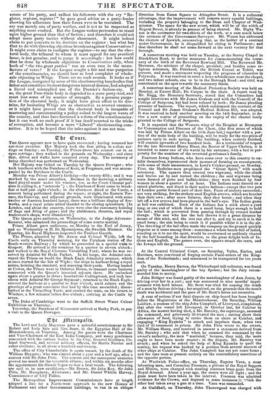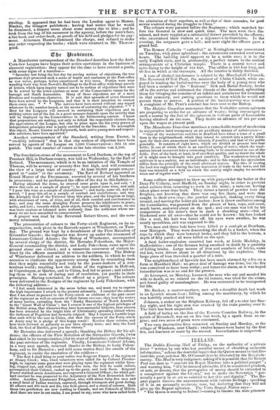Ebe Ifittropolis.
The Lord and Lady Mayoress gave a splendid entertainment to Sir Robert and Lady Sale and Mrs. Sturt, in the Egyptian Hall of the Mansionhouse, on Thursday. Among the guests were the Chairman and Vice-Chairman of the East India Company, and many gentlemen connected with the various bodies in the City, General Gardiner, Co- lonel Gurwood, and several military officers, Sir Harris Nicolas and other civilians; in all about a hundred-and-twenty.
The office of City Chamberlain is again vacant, by the death of Sir William Heygate ; who was elected about a year and a half ago, after a contest with Sir John Pine. The contest and the consequent anxieties proved too much for the venerable citizen ; and within six months after the appointment his friends began to fear a fatal result. The following are said to be now candidates,—Mr. Brown, Sir John Key, Sir John Pine, Mr. Humphery, Aldermen ; and Mr. Daniel Whittle Harvey, Commissioner of City Police.
The Metropolitan Improvement Commissioners have at length adopted a line for a North-west approach to the new Houses of Parliament and other Government buildings, to run in an oblique
direction from Eaton Square to Abingdon Street. It is a collateral advantage, that the improvement will remove many squalid buildings, including the property belonging to the Dean and Chapter of West- minster. The space for the mew street, which will be of the width of Regent Street, is already in process of being cleared. Mr. Rigby Wa- gon is the contractor for twe-rthirds of the work, at a sum much below the estimate of the Government-Surveyor. Mr. Wason has addressed the electors of Ipswich, announcing that, as the holder of a contract under Government, he is disqualified for sitting in Parliament ; and that therefore he shall not come forward at the next vacancy for that borough.
A numerous meeting was held on Tuesday, at the Surrey Chapel in Blackfriars Road, to devise measures for commemorating the cente- nary of the birth of the Reverend Rowland Hill, The Reverend Mr. Sherman, the minister of the chapel, presided ; and besides some re- ligious ministers, Mr. Pritchard, the British Consul at Tahiti, was present, and made a statement respecting the progress of education in Polynesia. It was resolved to erect a large schoolhouse near the chapel, and two infant schools, one to be in the Borough Road : and 600/. was contributed on the spot towards the necessary funds.
A numerous meeting of the Medical Protection Society was held on Monday, at Exeter Hall ; Dr. Carpue in the chair, A report read by Mr. Rugg, the Honorary Secretary, stated that the Committee had sought interviews with Sir James Graham and with the Council of the College of Surgeons, but had been refused by both ; Sir James pleading pressure of business. The report, which condemned the conduct of the Council and Sir James Graham's Medical Reform Bill, was adopted. It was resolved to hold another meeting on the 14th September, to de- vise a new course of proceeding on the expiry of the charter lately granted to the College of Surgeons.
It is expected that the Western wing of the Hospital at Brompton for Consumption and Diseases of the Chest, (the first stone of which was laid by Prince Albert on the 11th June last,) together with a por- tion of the main body of the building, will be ready for the reception of patients early in next spring. The building, when entirely finished, will contain upwards of two hundred beds. As a testimonial of respect for the late Reverend Henry Blunt, the Rector of Upper Chelsea, it is intended to name one of the wards by his surname, with a bed in per- petuity for the nominee of the reverend gentleman's family.
Fourteen ',away Indians, who have come over to this country to ex- hibit themselves, represented their manner of forming an encampment, with some of their amusements, in Lord's Cricket-ground, on Monday. First, the Medicine-man propitiated the "Great Spirit," with much ceremony. The squaws then erected two wigwams, while the chiefs and braves sat by and nursed the children ; the said wigwams being tents formed of poles and buffalo-hides : they were finished by four women in about a quarter of an hour. The Indians next danced on a raised platform, and dined in their native fashion—except that two pots of London porter formed part of their fare. Feats of archery succeeded; not very striking, for the archers used English arrows, which are heavier than their own : after some failures, they shot better ; and when they left off a few arrows had been placed in the bull's-eye. The Indian game at ball was exhibited. Each of the Indians has a stick about a yard long, at one end of which there is a small hoop, large enough to hold the ball; which is prevented from passing through by crossed leather thongs. The one who has the ball throws it to a great distance by means of this stick, and the rest run after it, and try to catch it in the small hoop ; the aim being to catch it if possible whilst it is in the air. The throwing of the ball often made the company on the ground quickly disperse as it came among them : sometimes a whole bench-fall of ladies, standing on it to see the sport, would be overturned or suddenly cleared by the ball bounding in that direction, to the great delight both of In- dians and English. The games over, the squaws struck the tents, and the Ioways left the ground.
At the Central Criminal Court, on Saturday, Valler, Enrico, and Harrison, were convicted of forging certain Fund-orders of the King- dom of the Netherlands ; and sentenced to be transported for ten years each.
On Tuesday, Henry Burton, the Whitechapel toll-collector, was found guilty of the manslaughter of the boy Spence ; but the Jury recom- mended him to mercy.
John Bridger was found guilty of the manslaughter of Ann Jones, by driving over her in a cart ; and was sentenced to nine months' impri- sonment with hard labour. Mr. Scott was tried for causing the death of a man by furious driving ; but acquitted, on the grounds that the man's death was accidental and the pace of Mr. Scott's horse not excessive.
A case of serious if not fatal dispute on ship-board has been brought before the Magistrates at the Mansionhouse. On Saturday, William Laidlaw, a seaman of the ship John Campbell, of Liverpool, complained, that after the vessel left Liverpool, in October last, for Calabar in Africa, the master having died, a Mr. Burnley, the supercargo, assumed the command, and grievously ill-treated the men ; cutting short their allowance of food, trying to entice them on shore at Calabar, and engaging "King Eyamba " to attack and imprison them, when two died of ill-treatment in prison. Sir John Pine wrote to the owner, Mr. William Sharp, and received in answer a statement derived from Mr. Burnley ; who said that when he assumed the command by the owner's authority, the men "mutinied," because, they said, the mate ought to have been made master ; in the dispute, Mr. Burnley was struck ; and when he asked the help of King Eyamba to quell the mutiny, his request was backed by a petition from several masters of other ships at Calabar. The John Campbell has not yet come home ; and the ease rests at present entirely on the contradictory assertions of the opposite parties.
At Woolwich Police-office, on Thursday, Eugene Yam, a stout labouring man, and Cornelius Freeman, a private of the Royal Sappers and Miners, were charged with stealing nineteen brass guns from the Royal Arsenal. About a year ago, the stores were all right ; and the guns must have been taken in the interval. Freeman was admitted evidence for the Crown, and deposed to some instances in -Nob the other had taken away a gun at a time. Vann was remanded.
At Guildhall, on Thursday, John Thorowgood was charged with
stealing. It appeared that he had been the London agent to Messrs. Blackie, the Glasgow publishers : having had notice that he would be dismissed, a dispute arose about some money due to him ; and he took from the bag of his successor in the agency, before the man's face, a list-book and order-book, as proofs of his debt and pledges for its pay- ment. Alderman Hunter dismissed the charge, and refused to make any order respecting the books ; which were returned to Mr. Thorow- good.



























 Previous page
Previous page